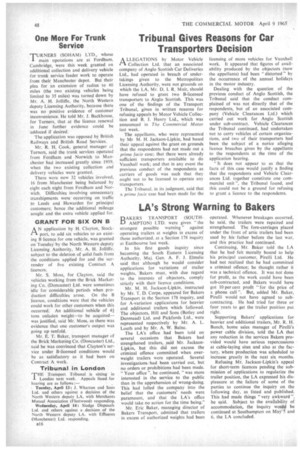LA's Strong Warning to Bakers
Page 50

If you've noticed an error in this article please click here to report it so we can fix it.
DAKERS TRANSPORT (SOUTH
AMPTON) LTD. were given "the strongest possible warning" against operating trailers at weights in excess of those authorized, at a Section 178 inquiry at Eastbourne last week.
In his first goods inquir,y since becoming the South Eastern Licensing Authority, Maj. Gen. A. F. J. Elmslie said that although he would consider applications for variations of trailer weights, Bakers must, with due regard to the interests of objectors, comply strictly with their licence conditions.
Mr. M. FL Jackson-Lipkin, instructed by Mr. T. D. Corpe, appeared for Bakers Transport in the Section 178 inquiry, and for A-variation applications for heavier and additional trailers which followed_ The objectors, Hill and Sorts (Botley and Denmead) Ltd. and Pickfords Ltd., were represented respectively by Mr. A. L. Louth and by Mr. A. W. Babe.
The LA's office had been told on several occasions that Bakers had strengthened trailers, said Mr. JacksonLipkin, but this did not excuse the criminal offence committed when overweight trailers were operated. Several investigations had been carried out, but no orders or prohibitions had been made, "Your office ", he continued, "was more interested in the service to the public than in the apprehension of wrong-doing. This had lulled the company into the belief that the customers' needs were paramount, and that the LA's office would take no action for the time being."
Mr. Eric Baker, managing director of Bakers Transport. admitted that trailers in excess of authorized weights had been
operated. Whenever breakages occurred, he said, the trailers were repaired and strengthened. The fore-carriages placed under the front of artic trailers had been used by his father before the last war, and this practice had continued.
Continuing, Mr. Baker told the LA that he had felt morally bound to help his principal customer, Pirelli Ltd. He had not realized that he had committed a criminal offence; he thought rather it was a technical offence. It was not done for profit, as the work could have been sub-contracted, and Bakers would have got 10 per cent profit "for the price of a phone call ". But, added Mr. Baker, Pirelli would not have agreed to subcontracting. He had tried for three or four years to get the trailer position put right.
Supporting Bakers' applications for heavier and additional trailers, Mr. R. H. Bunch, home sales manager of Pirelli's power cable division, told the LA that any reduction in the services Bakers provided would have serious repercussions at cable-laying sites and also at the factory, where production was scheduled to increase greatly in the next six months.
Refusing Mr. Jackson-Lipkin's appeal for short-term licences pending the submission of applications to regularize the trailer position, the LA expressed his displeasure at the failure of some of the parties to continue the inquiry on the following day, as listed and published. This had made things "very awkward ", he said. Subject to the availability of accommodation, the inquiry wo0141 be continued at Southampton on May 5 and 6, the LA concluded.




































































































































